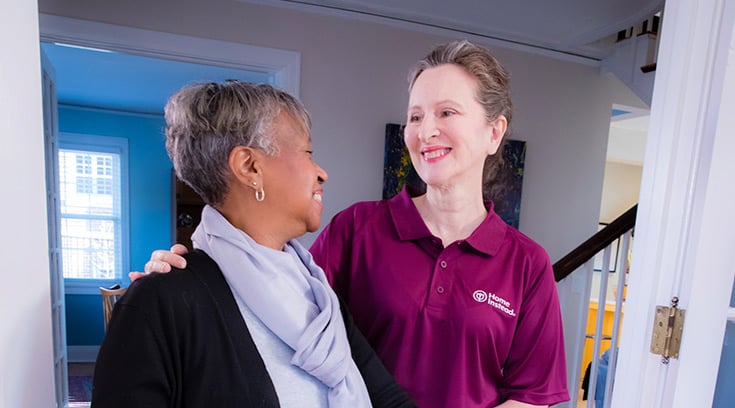Beth was concerned about the chocolate candies and potato chips she spotted on the table by her dad’s TV. Having been diagnosed with diabetes six months before, she suspected her father wasn’t following doctor’s orders.
After speaking with her 81-year-old father, Beth realized her dad hadn’t changed his diet, he wasn’t exercising like his doctor recommended, and Beth wasn’t even sure Dad was taking his medications.
Beth has good reason to be concerned, as do many other family caregivers whose loved ones are living with diabetes, a potentially dangerous disease that increases an aging adult's risk of developing cardiovascular disease, stroke, vision loss, kidney failure and the amputation of limbs.
More than 100 million U.S. adults are now living with diabetes or prediabetes, according to a 2017 Centers for Disease Control and Prevention (CDC).The report finds that as of 2015, 30.3 million Americans – 9.4 percent of the U.S. population – have diabetes. Another 84.1 million have prediabetes, a condition that if not treated often leads to type 2 diabetes within five years.
The disease continues to represent a growing health problem: Diabetes was the seventh leading cause of death in the U.S. in 2015, according to the CDC.
The good news is that diabetes can be managed, often through physical activity, diet, and the appropriate use of insulin and other medications to control blood sugar levels, according to CDC doctors.
How Family Caregivers Can Help
So what can family caregivers such as Beth do to help a loved one control diabetes? The experts offer this advice:
1.Be tactful
Since lifestyle issues such as poor diet and obesity often play a part in this disease, discussing this issue with a loved one could be tricky. At the same time, healthy choices are so important to managing the disease.
Home Instead® Gerontologist and Caregiver Advocate Lakelyn Eichenberger suggests approaching the topic from the perspective of the health effects of weight issues. Instead of calling out a person for being overweight, try having a discussion about the ways in which certain chronic health conditions are affected by weight. For instance, obesity not only reduces blood glucose control, but it can cause high blood pressure. The health effects of obesity may be reduced or eliminated by losing even a small amount of weight, experts note.
If possible, try to determine the root cause for your loved one’s overeating. Loneliness, depression, anxiety, and boredom can all prompt an older adult to consume too many calories. With compassion, you may be able to address these underlying issues and possibly improve your loved one's emotional and physical health in the process.
2. Educate to empower
Diabetes management can feel like a complex, overwhelming thing, especially for an older adult who may have multiple health conditions. You can help your loved one feel more confident and empowered to take on the task of diabetes management by arming them with key information, such as:
- How to recognize the signs and symptoms of diabetes, hypoglycemia, and hyperglycemia
- Things they can do to reduce their risk of complications
- The emotional effects of diabetes on older adults and caregivers, and how to recognize the signs of depression
3. Provide resources
Reach out to organizations like the American Diabetes Association for help and support to manage this condition. Solutions like Simple Meds can reduce the stress of medication management. For seniors who need assistance with larger issues, like housing or prescription costs, your local Area Agency on Aging could help provide assistance.
4. Offer practical tips
Many people know that diet and exercise are key components of successful diabetes management. But telling a frail 81-year-old man to walk 5 miles a day may not be a useful prescription for success. Work with your loved one’s doctor to tailor an individual plan. For example, suggest making small, incremental adjustments to nutrition and activity.
For some older adults, simply adding an extra helping of vegetables to each meal could be a better route to successful dietary change than recommending they throw out a lifetime of eating habits in favor of adopting a full-blown diabetes diet. Together, with your senior, study up on good eating and exercise habits for diabetes and then add in one change per week as a way to march steadily toward the goal of a full-featured diabetic eating plan.
5. Ask for help
An older adult – especially one who lives alone – could have difficulty managing the disease and find, like Beth discovered with her father, that it can be challenging to follow doctor’s orders. An exasperated senior could give up on trying to do anything at all. But inaction or misinformation could put a senior at risk and even turn deadly. For example, the CDC reports that mismanagement of four medications accounts for two-thirds of emergency hospitalizations each year. Of those four, two meds – insulin and oral hypoglycemic agents – are medications that are used to control diabetes.
If you can’t be there to help them, consider hiring a home care company. Home Instead Care Professionals can assist with medication management as well as meal planning and activities to help keep older adults properly managing health conditions such as diabetes.
The good news is that many older adults are living long and healthy lives controlling this disease with the help of family and professional caregivers. Exercise and nutrition also can be important for fighting other diseases such as osteoporosis.
In-Home Care for Chronic Conditions




